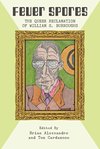William S. Burroughs is a complicated icon. A literary trailblazer who killed his wife. A revolutionary of the beat writers who came from a wealthy family. The new book “Fever Spores: The Queer …
This item is available in full to subscribers.
We have recently launched a new and improved website. To continue reading, you will need to either log into your subscriber account, or purchase a new subscription.
If you had a login with the previous version of our e-edition, then you already have a login here. You just need to reset your password by clicking here.
If you are a current print subscriber, you can set up a free website account by clicking here.
Otherwise, click here to view your options for subscribing.
Please log in to continue |
|

William S. Burroughs is a complicated icon. A literary trailblazer who killed his wife. A revolutionary of the beat writers who came from a wealthy family. The new book “Fever Spores: The Queer Reclamation of William S. Burroughs,” tackles all the facets of Burroughs through a queer lens. Each chapter tells a different story or gives a literary take on the man that many both idolize and revile. Anyone with a love of literature and especially literary criticism will gobble this book up.
I personally really enjoyed the chapters of writers revisiting Burroughs for their submission. In his chapter, “The Wild Boys,” Paul Russell details how “Wild Boys” was the first queer text he ever read as a young man. He then read the book at other points in his life and gained different things from the text each time. I loved reading about his latest read of the novel for this anthology. It is not easy to revisit a work that, even in some small way, shaped who you are as a young person and look at it with a critical eye. But at the same time, it can be extremely gratifying. We see why the book originally piqued our interest and also its “faults.” (But are they really faults if we learn from them and acknowledge them?) Russell notes that ‘the satire still sings,” but “the misogyny is persistent and troubling.” He skimmed certain parts, yet loved certain “wonderfully haunting phrases.” Russell reminds us that to revisit a book is a way to revisit a part of yourself.
The chapter “The Beats: Pictures of a Legend” by Edmund White was one that I found particularly interesting. I really loved White’s observation that Burroughs and his friends “were convinced they represented something new and monumental in literary history.” The idea of “artistic destiny” may seem pretentious, but it is also fascinating—to be so sure of you and your peers. I feel like I myself could learn something from that level of confidence. I also loved the quote from Allen Ginsberg that White used about how the beat writers mythologized each other’s characters and how it worked to their benefit.
“You have a small group of friends and you declare them all to be geniuses and you laud all their work and ascribe them sweet and stormy qualities worthy of the Greek gods,” Ginsberg said. “What you’re selling is not just your writing, but your personal legends.”
Whether they saw it that way or not, it was a genius stroke of marketing, whether for themselves or their peers.
Like I’m sure so many will, I thoroughly enjoyed the chapter that was an interview with Fran Lebowitz. “He Invented Something: An Interview with Fran Lebowitz” by Brian Alessandro is an entertaining read. She notes that while Burroughs’s work was not “her cup of tea,” she understood what he did. Lebowitz was the first person in the anthology to acknowledge Burroughs’s degree of privilege.
“Burroughs was from a rich family, so that makes a completely different kind of person,” Lebowitz said. “And even though he was gay, he was a man, and he was white, and he was rich. These things are incredibly important to forming people’s characters—more than their character, their personality. He grew up among the ruling class.”
Lebowitz was not indicting Burroughs, but merely stating facts. Her conversation with Alessandro is a highlight of the anthology.
Another highlight is the chapter “The Gift of the Tortured Specter” by Sam Desmond. Desmond writes about Joan Vollmer, Burroughs’s wife who died in a William Tell trick gone wrong. Desmond describes how as a young woman, she was drawn to the muses, the women attached to great men. Some of Desmond’s lines are so simultaneously poignant and beautiful, I feel as though they need to be jotted down in a notebook of quotes that make you feel.
“I vowed I’d marry a great man, but in making my fantasy realistic, I thought that meant I’d have to sacrifice marrying a good man,” Desmond writes.
“Muses, especially to men, often remain on a pedestal because they do not tell their own tales and have to wait for someone else to discover their own innate talents separate from inspiring a grand man.”
In closing her chapter about Vollmer, Desmond gives my favorite quote.
“She still cannot escape the male gaze that pigeonholes women to nurturing origin points for men’s accomplishments.”
“Fever Spores” was co-edited by Brian Alessandro and Tom Cardamone and published by Rebel Satori Press.
To purchase:
https://rebelsatori.com/product/fever-spores/
Comments
No comments on this item Please log in to comment by clicking here